Economic Plunder, Fraud and Electoral Chaos in The Democratic Republic of The Congo
The Role of the UN Mission
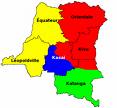
Congo deserves a leader who cares about the Congolese people
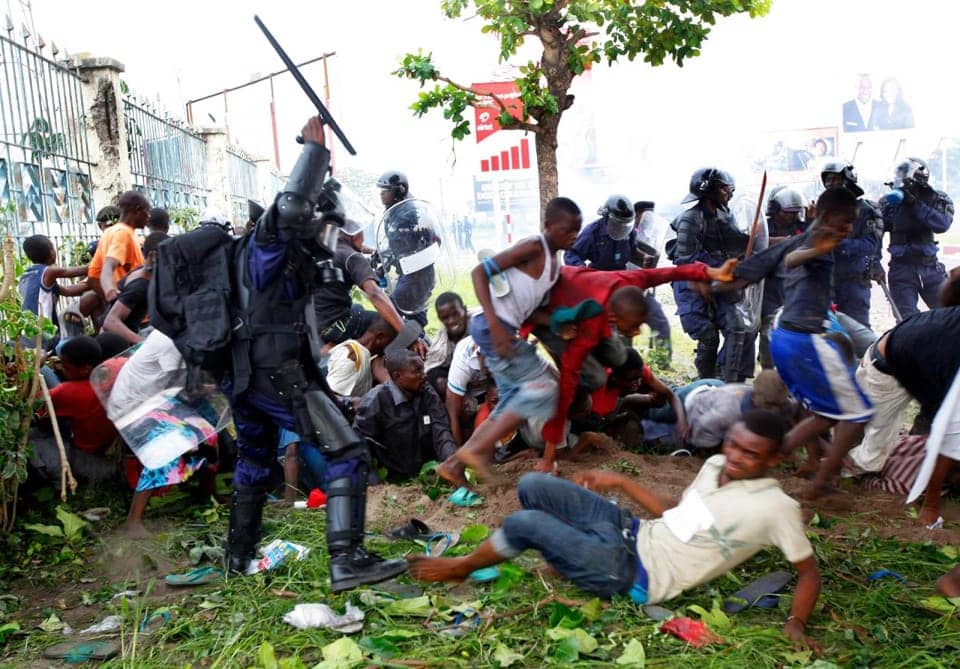 [1]
[1]
Police club Tshisikedi supporters as they attempt to march to meet him at the airport in Kinshasa, where Tshisikedi had been detained by police, on Nov. 27. – Photo: Reuters
The international community and the secretary general of the U.N. must explain why they are not calling out irregularities in the elections in the Democratic Republic of the Congo (DRC), instead of just saying that things are going relatively well – or pretending to ignore this election in the world’s most resource rich nation, with the world’s lowest standard of living and the highest death toll due to armed conflict since World War II.
This is what happened at the polls in the DRC on Nov. 28 and 29:
1) There were fictitious polling stations, polling stations with no ballots, polling stations stuffed with advance ballots previously checked with the name of incumbent President Joseph Kabila.
2) Ballots were stored by private individuals in their houses, instead of guarded official sites. This meant they could be filled out before they were delivered to the polls.
3) The names of many registered voters were not included on the lists.
4) State security forces attacked, wounded and killed civilians.
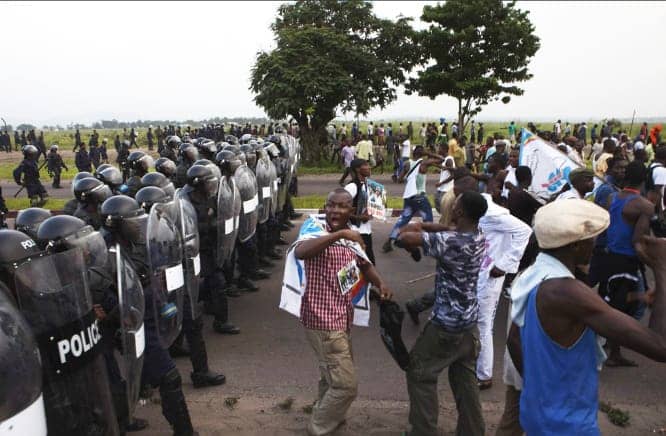 [2]
[2]
Riot police advance on demonstrators marching to meet opposition presidential candidate Étienne Tshisikedi at the airport in Congo’s capital and largest city Kinshasa, on Nov. 27. – Photo: Reuters
These are deliberate efforts to maintain the system for plundering Congo’s wealth instead of using it to improve the lives of Congolese people.
What is the real mandate of MONUSCO, the U.N. mission in Congo?
This system for plundering Congo was described in detail in the U.N. Report of the Panel of Experts on the Illegal Exploitation of Natural Resources and Other Forms of Wealth of the Democratic Republic of the Congo, 2001 [3], 2002 [4], 2003 [5] and 2008 [6]. However, MONUSCO, the United Nations Organization Stabilization Mission in the Democratic Republic of the Congo [7], remains in Congo, with U.N. troops but without disrupting, much less eliminating, the system of plunder.
Indeed, this year, a North Kivu judge sentenced a MONUSCO driver and his accomplice to three years in prison and a $25,000 fine after they were arrested attempting to cross the Congolese border into Rwanda with 1,200 kilograms of the mineral cassiterite.
MONUSCO spokesman Madnodje Mounoubai insisted that this was a singular incident and denied allegations that the U.N. mission is involved in the very plunder they’re supposed to be there to prevent. However, Congo Planet pointed out [7] that this is not the first time MONUSCO peacekeeping troops have been caught smuggling minerals and that they have even been accused of dealing weapons to militias smuggling minerals. Congo Planet called for MONUSCO to subject its own vehicles to inspection at Congolese border crossings.
Human Rights Watch, in a press release regarding a letter that it sent to the United Nations under-secretary-general for U.N. peacekeeping operations, titled “U.N.: Hold Peacekeepers Accountable for Congo Smuggling [8],” wrote, in 2007:
“Human Rights Watch first brought information about gold smuggling by peacekeepers to the attention of the United Nations in December 2005, and an investigation was begun. The BBC conducted its own investigation, broadcast on May 23, 2007, which quoted a U.N. official as saying that there was a desire to ‘bury the result’ for political reasons.”
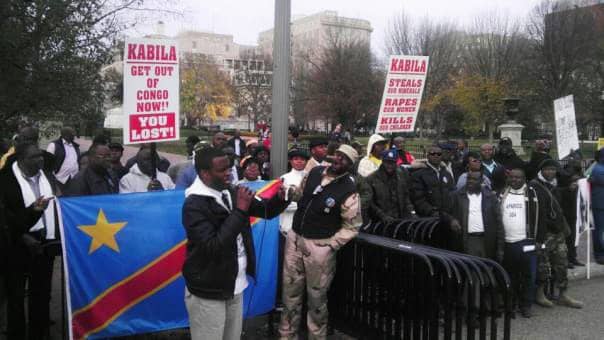 [9]
[9]
Congolese Americans rally in Lafayette Square on Nov. 26, asking President Obama to support a free and fair election in the Democratic Republic of the Congo, which they say would make Étienne Tshisikedi the country’s next president. – Photo: Abraham Luakabuanga
Why would anyone now expect the same MONUSCO to be working to support a free and fair election in Congo, especially if a candidate chosen by the people might finally mount a real effort to end the plunder and restore Congolese resources to the Congolese people?
Ending the plunder would be a daunting task, given the well established criminal networks described in the U.N. reports and given the huge markets for smuggled minerals. But is there any reason to think that MONUSCO would want the Congolese to elect a president committed to stopping the plunder or that MONUSCO would help such a president?
There is a clear parallel between the 2006 and 2011 presidential elections.
In 2006, the U.N. Mission in Congo was called MONUC, the United Nations Organization Mission in the Democratic Republic of the Congo, before its name was changed to MONUSCO, in 2010. MONUC was led by former U.S. Ambassador to the DRC William Lacey Swing [10], who had a very controversial record. And the 2006 election was not free and not fair, though that was not the story sold to the world.
In 2011, MONUSCO is headed by another former U.S. ambassador to the DRC, Roger Meece. And, once again, the country is confronted with election chaos, including shootings, beatings and tear gas of an opposition candidate’s political supporters. Can anyone explain this?
 [11]
[11]
Opposition presidential candidate Étienne Tshisikedi speaks to the press while detained at the Kinshasa airport on Sunday, Nov. 27, two days before the polls. While he was detained, military police beat, tear gassed and fired on supporters marching to the airport to meet him. – Photo: Reuters
Opposition candidate Étienne Tshisikedi has called on U.N. Secretary General Ban Ki-Moon to appoint someone “less corrupt and more credible” than Roger Meece to head MONUSCO. It is imperative that the secretary general answer the following questions honestly:
Why are former U.S. diplomats appointed to head the U.N. Mission in Congo? Is it a coincidence or a rule?
How does he, Secretary General Ban Ki-Moon, explain the electoral chaos in the Democratic Republic of the Congo, despite nearly $9 billion U.N. dollars spent on MONUC and then MONUSCO since 1999 [12]?
How does he explain the ballots so obviously transported and distributed by CENI (Independent National Congolese Electoral Commission) and, in some cases, by MONUSCO, that ended up in private rather than official hands?
How much credibility can the U.N. have when its staff is involved in plundering the country with the lowest standard of living in the world?
The Congolese population is overwhelmingly rejecting President Joseph Kabila, not only because he failed to repair or build new Congolese infrastructure or improve their standard of living in 10 years’ time, but also because he failed to stop the plunder.
Nevertheless, Kabila is enjoying the support of foreign heads of state and the international business community. They are expected to make every effort to keep him in power, even though there can be no credibility to an announcement that he has won.
The determination of the Congolese people has taken the world by surprise
The Carter Center’s election monitoring mission wrote, “It was evident to observers that large numbers of Congolese voters were determined to exercise their fundamental political rights.” That determination has been far beyond anything the world expected.
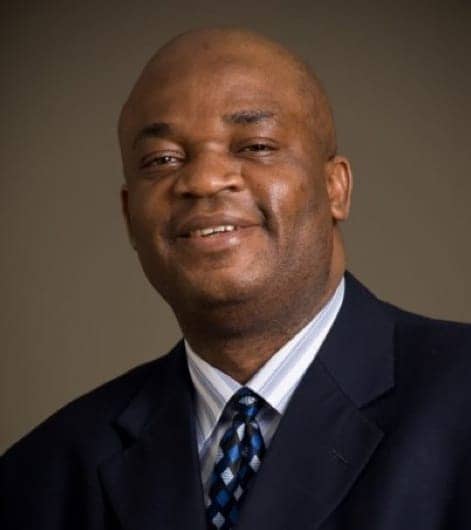 [13]
[13]
Congolese-born Congolese-American Eric Kamba, the author, says that he cannot safely return home so long as Joseph Kabila is in power.
On Nov. 30, the New York Times reported that initial results were showing opposition candidate Étienne Tshisikedi leading 3 to 1 in the country’s capital and largest city, Kinshasa, but that the national electoral commission, headed by a friend of President Joseph Kabila, is threatening to disqualify tens of thousands of opposition votes.
Courageous and determined Congolese people are saying, “No, enough is enough. Change has come to Congo. We want President Tshisikedi,” and the rest of the world should stand with them. A phone call from Barack Obama to Joseph Kabila saying, “It’s over; you lost; time to step down,” could probably stop a bloodbath in the heart of Africa.
Eric Kamba is an activist and editorial writer and a social worker with the Boston-based Congolese Development Center. He says he cannot safely return to his home in Congo so long as Joseph Kabila remains in power. Eric can be reached at [email protected] [14]. President Obama can be reached at (202) 456-1111 to leave a comment or (202) 456-1414 for the switchboard. Eric Kamba, with research and editing assistance from Ann Garrison
Eric demonstrates outside the White House with other members of the Congolese diaspora in the U.S. on Nov. 27.
Agence France Presse reports from the DRC Nov. 27.
Aljazeera in the DRC Nov. 27
Aljazeera in the DRC Nov. 29

